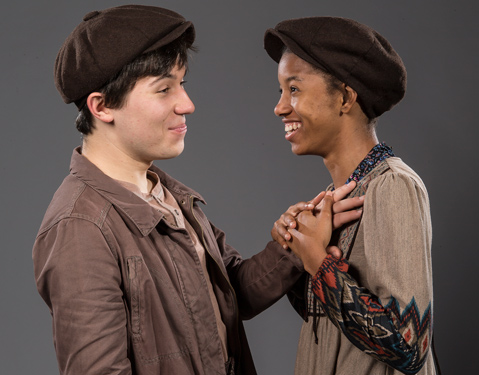‘Bernhard’ at UCSB
Launch Pad Presents a New Play by Lynn Rosen

We’ve all been there to a certain extent — that place where things are so horrible you just have to laugh, not so much to keep from crying but because the situation has become absurd. For Austrian writer Thomas Bernhard, whose dense, Kafka-esque novels are considered some of the best 20th-century writing in the German language, this moment came early and often. Born out of wedlock, he never knew his father, a man for whom abandoning his lover and her infant was not enough — he also had to light their house on fire on his way out. Blamed by his mother for the disappearance of his dad, Bernhard was abused by her until she finally split, too, leaving him to fend for himself during the Nazi Anschluss.
When New York playwright Lynn Rosen read Gathering Evidence, Bernhard’s memoir of his World War II adolescence, it struck a chord that she has since developed into a play. The story, loosely based on the writer’s quest to find his runaway mother in the wreckage of post-war Europe, comes to the stage this weekend at UCSB, where Rosen is the current recipient of the university’s prestigious Launch Pad residency, a program that brings together professional playwrights’ works in progress with faculty and students of the school’s MFA program in theater. I sat down with Rosen a few weeks ago in Isla Vista to hear about her journey with Bernhard.
This play is inspired by, but not directly about, the Austrian writer Thomas Bernhard. Why did you choose him, and how does that work?
I chose him because he’s funny in the face of terrible things. It’s an anti-establishment rant from a perspective that’s destined for extinction. I was watching the news about this country in my home of New York City, and what I saw was terrifying and dark. I have children, and I was hearing things that I felt that one should not have to endure. And that’s when I began to understand Gathering Evidence, Bernhard’s final autobiographical writing. His actual experience was harrowing to the point of being comical, and he decided that from then on, he would live rather than merely survive. It’s an amazing pivot, and I hope that’s what makes this a timely play.
As for how it works, my play is purposely not set in a specific time and place. There will be 10-12 parts, but not all of them are main characters; some are ghosts, and there’s a chorus. The leads are Bernhard, who will be played by Fletcher Hoffman, his love interest, and his buddy turned nemesis.
And what’s the tone? Is it a comedy?
It’s serious and funny, with the laughs coming fast and furious, but there are also moments where you might be crying. The humor stems from the gap between reality and illusions.
Is the language poetic? Are there monologues as in Thomas Bernhard’s novels?
It starts with a monologue. The speech is elevated throughout, but the stakes are real. Bernhard is just trying to make it through the day. He’s trying to find the mother who abandoned him, and it’s in the aftermath of a war. He becomes a refugee.
What about the other characters? How do they fare?
People die, people get lost, people get rediscovered. It’s very musical.
How would you describe the status of this production?
It’s a workshop production of a first draft. It’s also, thanks to Launch Pad, a full show directed by Anne Torsiglieri and running for two weeks. The play is still evolving even as we stage it.
What’s your impression of Launch Pad?
It’s a rare opportunity, and it’s going to help American plays get better. — Charles Donelan
4·1·1
Bernhard runs November 4-5 and 8-12, at 8 p.m., and on November 6 and 12-13 at 2 p.m., at UCSB’s Performing Arts Theater. For tickets and information, visit theaterdance.ucsb.edu or call 893-2064.



